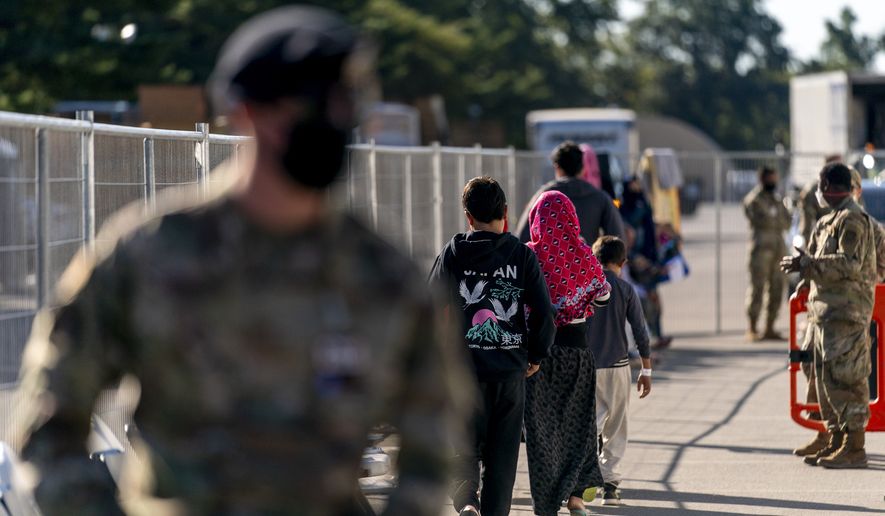The last of the 76,000 Afghan evacuees pulled out of the country last summer have finally been released into the U.S., the government announced over the weekend — just as a report said not all were fully vetted.
The Pentagon’s inspector general said some secretive Defense Department databases weren’t initially available to screeners. As a result, dozens of people with “significant security concerns” reached the U.S.
Officials had no idea where most of them were, the inspector general said in an audit late last week.
“Not being able to locate Afghan evacuees with derogatory information quickly and accurately could pose a security risk to the United States,” the inspector general concluded.
It has been nearly six months since the conclusion of the Afghanistan airlift, capping off a chaotic withdrawal of U.S. troops after a 20-year war.
The Biden administration brought more than 76,000 Afghan evacuees out of their home country, sent them through transit points for initial screenings and then brought them to refugee camps at eight military bases on U.S. soil.
The final two camps emptied out last week, and the Afghans were settling in communities across America, the Department of Homeland Security said Saturday.
It marked the largest surge of migrant resettlement in a half-century, the State Department said.
Resettlement advocates cheered the news as the capstone to a “herculean effort” of evacuation but warned that successful integration of the migrants continues.
“We remain confident we can rise to the occasion in light of the overwhelming compassion and generosity of Americans across the country who have answered the call to help. Their message has been crystal clear: Afghan refugees are welcome here,” said Krish O’Mara Vignarajah, president of Lutheran Immigration and Refugee Service, one of numerous agencies working to resettle Afghans.
The airlift and housing plan was dubbed Operation Allies Welcome and billed as a chance to help Afghans who risked their lives to assist the U.S. war effort and who were in line for the Special Immigrant Visa program.
In reality, most of those evacuated did not appear to qualify for the special visa. They had other ties to the U.S. or were simply better positioned to reach the airport in Kabul during the rapid Taliban takeover in August.
Many of those left behind are desperate to escape, and the Biden administration said it is interested in helping.
The migrant camp at Joint Base McGuire-Dix-Lakehurst in New Jersey, the last to release evacuees from the August airlift, will take any newcomers, Homeland Security said.
The department insists those who made it to the U.S. faced “rigorous, multi-layered screening” — chiefly checks of U.S. databases to find any red flags attached to names.
The inspector general’s report found serious holes in the process.
The audit said information from several Defense Department systems was excluded from database checks. As a result, dozens of people with “significant security concerns” reached the U.S.
Many of those were released or walked off the military bases before officials realized the security breach, and the government was having a tough time tracking them down, the inspector general reported.
The botched database checks added to revelations that most evacuees reached the U.S. without undergoing in-person interviews.
That marks a departure from the usual processing of Afghans. Experts say the interview is a crucial security step, where trained people sniff out bogus or dangerous claims.
Sen. Tom Cotton, Arkansas Republican, called the botched database checks a “debacle.”
“Joe Biden promised to vet the evacuees that came to America after his retreat from Afghanistan. But he didn’t, and now American lives are at risk,” he said in a statement.
Sen. Chuck Grassley of Iowa, the top Republican on the Senate Judiciary Committee, said news of vetting problems should slow the effort to give permanent legal status to the evacuees.
Most Afghan evacuees were brought to the U.S. under Homeland Security Secretary Alejandro Mayorkas’ power of “humanitarian parole.”
That short-term legal status lets them live and work in the U.S. and gives them a chance to secure more permanent status through asylum, a special visa or other means.
Most are expected to claim asylum but could face hiccups.
One asylum officer ruled in a case last month against an evacuee. Although conditions in Afghanistan are rough, the officer said, the evacuee didn’t face any personal threats from the Taliban government.
“Despite country reports indicating that the Taliban are openly targeting people and their family members, you do not seem to fall within the realm of the people they are targeting due to the work you did with the United States government as a mechanic, and the fact that no one in your family still living in Afghanistan have been harmed, threatened or questioned about you,” the asylum officer wrote in a “Notice of Intent to Deny,” which caught the attention of immigration lawyers.
• Stephen Dinan can be reached at sdinan@washingtontimes.com.




Please read our comment policy before commenting.